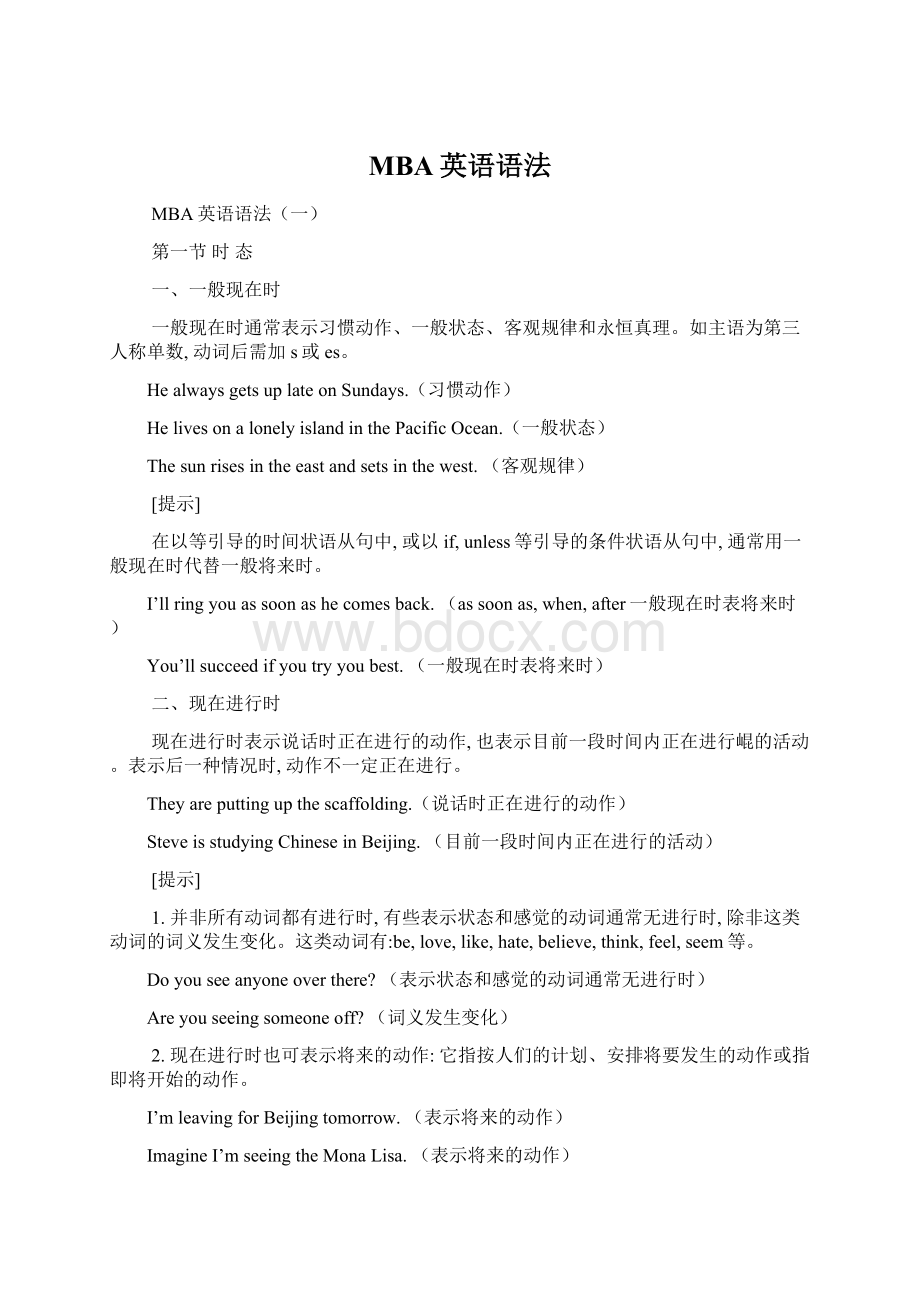MBA英语语法Word文档格式.docx
《MBA英语语法Word文档格式.docx》由会员分享,可在线阅读,更多相关《MBA英语语法Word文档格式.docx(26页珍藏版)》请在冰豆网上搜索。

Doyouseeanyoneoverthere?
(表示状态和感觉的动词通常无进行时)
Areyouseeingsomeoneoff?
(词义发生变化)
2.现在进行时也可表示将来的动作:
它指按人们的计划、安排将要发生的动作或指即将开始的动作。
I’mleavingforBeijingtomorrow.(表示将来的动作)
ImagineI’mseeingtheMonaLisa.(表示将来的动作)
3.现在进行时也可用来给习惯性动作加上赞赏或讨厌等感情色彩。
Sheisalwayscookingsomedeliciousfoodforherfamily.(感情色彩)
Heisalwaysfindingfaultwithhisemployees.(感情色彩)
三、现在完成时
现在完成时表示目前已完成的动作或刚刚完成的动作,也可表示从过去某一刻发生,现仍延续着的动作或情况。
此时态强调动作对现在的影响。
Theconferencehaslastedforfivedays.(已完成的动作)
He’sjustboughtannuusualtaxi.(刚刚完成的动作)
2MBA英语语法
(一)
1.当句子中出现表示到现在为止这段时间的状语时,谓语动词一般用现在完成时。
此类状语有upto(till)now,sofar,thesedays,thissummer,for…(后接一段时间的短语),since…等。
Wehaven’tseeneachotheragainsincewegraduatedin1987.
2.句中谓语动词是用一般过去时还是用现在完成时主要取决于动作是否对现在有影响。
Whatdidshesayaboutit?
IhavelivedinNanjingfor15years.(对现在有影响)
四、一般过去时
一般过去时表示过去某个特定时间发生且一下子就完成的动作,也可表示过去习惯性的动作。
一般过去时不强调动作对现在的影响,只说明过去。
IhadawordwithJuliathismorning.(一下子就完成的动作)
Hesmokedfortycigarettesadayuntilhegaveup.(习惯性的动作)
1.一般过去时常与表示过去的时间状语或从句连用,如yesterday,lastweek,in1993,atthattime,once,duringthewar,before,afewdaysago,when…等。
2.“usedto+动词原形”表示“过去常常”而现在已停止的习惯动作。
Heusedtoworkfourteenhoursaday.(过去常常)
另外,注意区别“usedto”和“beusedto”。
后者意为“习惯于…”,to为介词,后跟名词或动名词。
Sheisusedtohardwork.
她习惯于艰苦工作。
五、过去进行时
过去进行时表示过去某时正在发生的动作,也可表示过去某段时间内正在发生或反复发生的动作。
YesterdayafternoonFrankHawkinswastellingmehisexperiencesasayoungman.(过去正在发生)
Billwascoughingallnightlong.(过去反复发生)
六、过去完成时
过去成时表示过去某时之前已完成的动作或状况。
在时间上,它属于“过去的过去”。
在句中常有明显的参照动作或有表示“到过去某时为止”的时间崐状语。
Bytheendofthewar,thesmallworkshophadbecomealargefactory.
3MBA英语语法
(一)
Theyfoundthatastreamhadformedinthefield.
七、一般将来时
一般将来时表示某个将来时间会发生的动作或情况,也可表示将来反复发生的动作或习惯性的动作。
HewilltakepartinanimportantraceacrosstheAtlantic.(将来发生)
ThestudentswillhavefiveEnglishclassesperweekthisterm.(将来反复)
begoingto,beto,beaboutto等也可表示将来发生的动作,但它们常常表示打算、计划、安排和即将要发生的动作。
will表示说话人认为、相信、希望或假定要发生的动作或情况。
八、将来进行时
将来时间时表示将来某时正在发生或持续的动作。
其构成:
will+be+动词的现在分词。
I’llbereadingthistimetomorrow.(将来正在进行)
Mostoftheyoungpeopleinthetownwillbemeetingthematthestation.(持续)
九、将来完成时
将来完成时表示将来某时前已完成的动作,它与可用来表示推测。
Theywillhavestayedhereforfivemonthsnextweek.(将来完成)
Bytheendofnextmonth,theywillhavestudiedtwentypassages.(推测)
十、现在完成进行时
现在完成时间时表示从过去某时开始一直持续到现在的动作。
此动作或情况可能已停止,也可能继续下经也可表示刚结束的动作。
I’vebeenworkingforIBMfor15years.
I’vebeenwaitingforanhourbutshestillhasn’tcome.
现在完成时和现在完成进行时的区别是:
前者一般表示已结束的动作或情况,它强调对现在的影响。
后者一般表示仍在进行或刚刚还在进行的动作或情况,它强调动作的延续性。
Ihavethoughtitover.
我已经考虑过这件事了。
Ihavebeenthinkingitover.
我一直在考虑这件事。
Becarful!
Peterhavebeenpaintingthecar.
4MBA英语语法
(一)
注意!
彼得刚才还在给这部车上油漆。
(油漆尚未干)。
Exercies1Choosethebestanswertocompletethefollowingsentences:
1.Evenifit_________thisafternoon,Iwillgothere.
A.hasrainedC.rainsB.willrainD.willhaverained
2._________lastyearandisnowearninghislivingasanadvertisingagent.
A.HewouldheaveschoolC.HehadleftschoolB.HeleftschoolD.Hehasleftschool
3.We_________eachotherfortenyears.
A.hadknownC.havebeenknowingB.haveknownD.know
4.Theyfulfilledtheplanearlierthanthey_________.
A.haveexpectedB.expectedC.wereexpectingD.hadexpected
5."
Willshefinishtheworksoon?
"
"
Yes,she_________bynextFriday."
A.shallfinishB.finishC.rainsD.willhavefinished
6.It_________almosteverydaysofarthismonth.
A.israiningB.rainedC.rainsD.hasbeenraining
7.Mywife_________.
A.hasforevercriticizedmeB.forevercriticizesmeC.wasforevercriticizingmeD.isforevercriticizingme
8.He_________inasmallworkshop,butnowheistheheadofabigbusinesscompany.
A.usedtoworkingB.wasusedtoworkC.usedtoworkD.wasusedtoworking
9.Mygrandmother_________rurallife.
5MBA英语语法
(一)
A.hasusedtoB.usedtoC.isusedtoD.usesto
10.I_________mybreakfastwhenthemorningpostcame.
A.hasB.hadbeenhavingC.washavingD.havebeenhaving
11.I’mgladthatPeterdecidedtocometothepartybecausewe_________himforseveralyears.
A.haven’tseenB.don’tseeC.didn’tseeD.hadn’tseen
12.Theconference_________afullweekbythetimeitends.
A.haslastedB.lastsC.willhavelastedD.islasted
13.Thecomputer,workingveryfast,_________dataatthespeedoflight.
A.hashandledB.handledC.handlingD.handles
14.Thesun_________intheeastand_________inthewast.
A.rise,setB.rises,setsC.rose,setD.isrising,issetting
15.YesterdayafternoonFrankHawkings_________hisexperienceasayoungman.
A.wastellingB.toldC.tellD.istelling
第二节语态
被动语态常用于下列几种情况:
一、动作的执行者无需指出或不明确时
PrintingwasintroducedintoEuropefromChina.
Romewasnotbuiltinaday.
二、为了强调动作的承受者
Fourpeoplewerekilledandthirty-oneinjuredinthebombattack.
Susanwassingledoutforpraiseyesterday.
三、为了修辞的需要
Hestartedtocomplainaboutthiswickedworldbutwasinterruptedbyaknockatthedoor.
YesterdayuhevisitedouruniversityandwaswelcomedbythePresident.
[提示]
1.除及物动词外,一些相当于及物动词的短语动词也可作用被动态形式,除个别情况外,短语动词一般不拆开使用。
Thismatterwillbedealtwithassoonaspossible.(短语)
2.不及物动词(或相当于一个不及物动词的短语动词)和表示状态的动词(或短语动词)无被动态形式,如happen,rise,occur,takeplace,breakout等;
以及lack,fit,suit,equal,become,resemble,befall,consistof,looklike等。
Thestorytookplacein1949.
3.将主动态形式改为被动态形式时如遇到动词后跟双宾语的情况,我们只能将其中之一变成主语,另一个保持不变。
当直接宾语变成主语时,保持在原位的间接宾语前需加介词to。
Igavemyhasbandatieasabirthdaypressent.
→Myhasbandwasgivenatieasabirthdaypresent.
→Atiewasgiventomyhusbandasabirthdaypresent.
Exercises2Choosethebestanswertocompletethefollowingsentences:
1.Theprofessorwasknowledgeableandeloquentand___B_______withenthusiasm.
A.wasalwayslistenedB.wasalwayslistenedto
C.alwayswaslistenedD.alwayslistenedto
2.Hereturnedaweeklaterandfoundhishouse____D______.
A.hasbrokenintoB.wasbrokeninto
C.tobebrokenintoD.hasbeenbrokeninto
3.TheUnitedKingdom_____C_____GreatBritainandNorthernIreland.
A.consistedofB.isconsistedof
C.consistsofD.consist
4.Theseoranges______B____nice.(smellfeeltaste主动形式可表被动)
A.aretastedB.taste
C.istastedD.tastes
5.In1950,shewasthelargestshipthat______D____.
A.waseverbuiltB.haseverbuilt
C.haseverbeenbuiltD.hadeverbeenbuilt
6.Thehousesuddenlycollapsedwhileit____C______down.
A.waspulledB.pulled
C.wasbeingpulledD.hadbeenpulled
7."
Howdoyoulikeyournewposition?
I____B______."
A.don’tsatisfyB.amnotsatisfied(状态)
C.can’tsatisfyD.haven’tsatisfied
8.Thesixthgenerationcomputers,withartificialintelligence,________D__andperfectednow.
A.developedB.willhavebeendeveloped
C.havedevelopedD.arebeingdeveloped
9.Therearemorethanfiftyproposals___B_______attheconference.
A.discussedB.tobediscussed
C.discussingD.havingdiscussed
10.ThoughNewtonwasagreatscientist,manyofhisideas
________D__todayandarebeingmodifiedbytheworkoftoday’sscientists.
A.aretochallengeB.arechallenging
C.maybechallengedD.havebeenchallenged
第三节虚拟语气
一、虚拟式用于非真实条件句时的构成
IfIhadtime,Iwouldgotothemovieswithyou.
Ifwehadn’tmadeadequatepreparations,theconference,wouldn’thavebeensosuccessful.
Ifitweretoraintomorrow,thegamewouldbeputoff.
1.在非真实条件句中,有时从句的动词所表示的动作和主句的动词所表示的动作并不同时发生,这样的条件句中使用的虚似式称为混合虚拟式。
其构成视具体情况而定。
IfIhadtakenmyraincoatwhenIcameoutthismorning,Iwouldnotbewetnow.
IfIwereyou,Iwouldn’thavemissedthefilmlastnight.
2.引导非真实条件从句的连词if在正式文件中有时可以省去,were,had,
should等非行为动词这时应提到从句句首。
IfIwereyou,Iwouldn’tfeelsorry.
→WereIyou,Iwouldn’tfeelsorry.
3.有些句子从表层结构上看无if引导的非真实条件句,但从深层意思上看是存在的。
这种情况下主句动词仍需用虚拟式。
这类句子中常出现without(如果没有),butfor(要不是),otherwise(否则),butthat(若不,后接一从句)等词或词组。
Butforyourhelp,theycouldn’thavesucceeded.
要不是你的帮助,他们就不会取得成功。
Shewasn’tfellingwell.Otherwiseshewouldn’thaveleftthemeetingsoearly.
她感不舒服。
不然她不会那么早就离开会场的。
二、虚拟式也可用于其他情况
1.在it’snecessary(important,natural,essential,proposed,required,
suggested,impossible,strange)that…引导的真正的主语从句中动词应用虚拟式,
表示必要、应该、建议、要求、惊讶、不相信等意。
It’snecessarythatwe(should)setoutatonce.
It’sproposedthatacommittee(should)besetuptolookintothematter.
It’sonlynaturalthatyoushouldbenervous.你感到紧张是很自然的。
Thedentistsuggestedthatshe(should)comeanotherday.
Itishighlyimportantthatwe(should)combinerevolutionarysweepwith
practicalness."
对我们来说,把革命气概和实际精神结合起来是很重要的。
Itisimpossiblethath